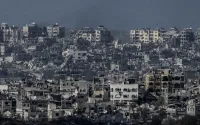12 October 2008Vaclav Havel
The global financial crisis may be grabbing all the headlines, but resolving it should not be allowed to crowd out other vital issues. In the Middle East, for instance, Israelis and Palestinians – as well as many others around the world – are beginning to believe that the negotiations to determine the long-term status of Palestine are going nowhere.
The situation may be more promising than it appears, but one cannot deny that hope for real changes on the ground has faded since talks were relaunched two years ago. This loss of faith is, sadly, establishing a dynamic that will itself inhibit the concessions that are needed if a permanent agreement is to be found.
Because an impasse beckons, it is vitally important to work on those areas in which intensive negotiations have the potential to produce quick results. Fresh water is one such area.
Across the Middle East, water is a security issue. Indeed, people are now recognising two important facts. First, nations faced with conflicting claims to water have historically found ways to collaborate rather than to fight. Even during the 60 years of conflict in the Jordan Valley, water has more often been a source of cooperation than of conflict.
Second, water scarcity is seldom absolute, and even less often an explanation of poverty. To quote the United Nations Human Development Report for 2006: "There is more than enough water in the world for domestic purposes, for agriculture and for industry …Scarcity is manufactured through political processes and institutions that disadvantage the poor."
But almost every nation in the Middle East is using more water than arrives on a renewable basis. There simply is not enough water for everything these nations want to use it for, and the situation will only worsen. Yet, even in Palestine, the crucial water issue is not thirst, but arrested economic development. In the short term, Palestine needs more water to provide employment and income from farming; in the longer term, educational, cultural, and political changes are needed in order to develop a capacity to adapt.
The region's climate and geography mean that water resources are unavoidably shared. But only if water is shared in a rational manner that respects the region's fragile ecology will human life be sustainable.
Clearly, no final agreement on water will be possible until there are agreed-upon borders between the state of Israel and the state of Palestine (assuming a two-state solution), and some resolution of the Israeli settlements in the West Bank. But any interim resolution of water issues does not need to wait for final resolution of the major questions of territory. Finding rational ways to share and co-manage water may be easier than solving the "big" issues. In fact, water could help to create a climate of success that aids political progress in other areas.
The good news is that the quantity of water that is needed for drinking, cooking, other household chores and sanitation is small. Most water is used to grow food, so, if a nation's economy is healthy, there is scope for saving water by importing a greater share of food, although every nation will want to maintain some assured food supply for security reasons.
The bad news is that water, unlike land, cannot simply be divided. Water flows on the surface and underground. As it moves, it changes in quantity and quality, and it supports different ecosystems. Moreover, demand for water changes over time. Only a few percentage points of the Israeli GNP come from agriculture today; as a result, its economy requires less water than it once did. Exactly the same transition is likely to occur in Palestine, but it has not happened yet.
Few Israelis deny that Palestinians need more water. Similarly, there is wide agreement that some water currently used by Israelis will have to be allocated to Palestinian use. The current negotiations will inevitably deal with rights to water, which do not seem to be very contentious any more, and the talks can suggest various mechanisms for transfer of management in some cases and for shared management in others.
These are eminently negotiable issues. A flexible and sustainable formula can certainly be found, almost surely including a transitional period that allows both sides to adjust to and account for their different water management systems, as well as for changing conditions and institutions in the future. The principle of a just division of water resources to meet the Palestinians' urgent needs for additional water should be taken as a starting point. Everything else can be worked out.
Shared water calls for flexible, continuous, cooperative water management, based on agreed-upon rights and responsibilities, as well as continuing monitoring and dispute resolution mechanisms. One important point should be added: extensive public participation and transparency, in terms of both process and outcomes, will be key to successful management.
We believe that progress in the peace process and in finding solutions for water issues between Israel and Palestine would also help to unblock progress in the broader region, between the parties on the Jordan, the Orontes, the Tigris, and the Euphrates rivers. Water can be a catalyst for regional cooperation, opening the way to a future comprehensive community of water and energy to enhance the human environment. In such a forum, water and solar energy in tandem could help to move the Middle East from conflict to collaboration.
The cost of inaction or merely pretending to act is likely to be high for everyone in the Middle East. Future water policy should no longer be seen as an extension of current policy, but rather as a new opportunity. Water is the essence of life. People in Palestine and in Israel need it; people in the region need it. Cooperating to secure it is the only way forward.
Václav Havel is former president of the Czech Republic; André Glucksmann is a French philosopher; Frederik Willem de Klerk is a former president of South Africa; Mike Moore is a former director general of the World Trade Organisation; Yohei Sasakawa is a Japanese philanthropist; Karel Schwarzenberg is foreign minister of the Czech Republic; George Soros is a financier; El Hassan bin Talal is a Prince of Jordan; Desmond Mpilo Tutu is a Nobel Peace Prize laureate; Richard von Weizsäcker is a former president of Germany; Grigori Yavlinsky is a Russian politician.
Copyright: Project Syndicate, 2008. www.project-syndicate.org
http://www.guardian.co.uk/commentisfree/2008/oct/12/middleeast-israelandthepalestinians






